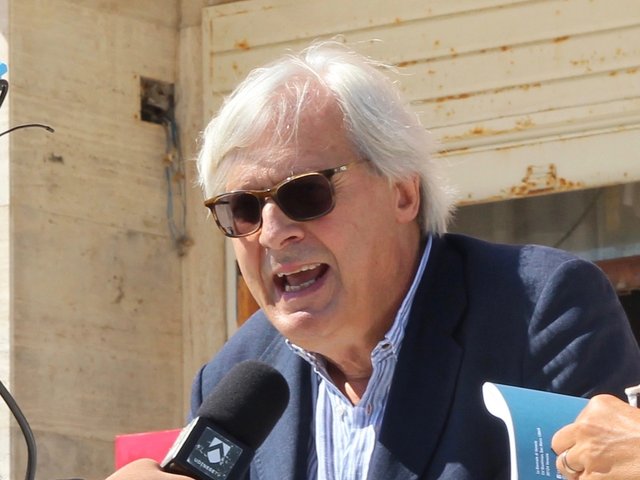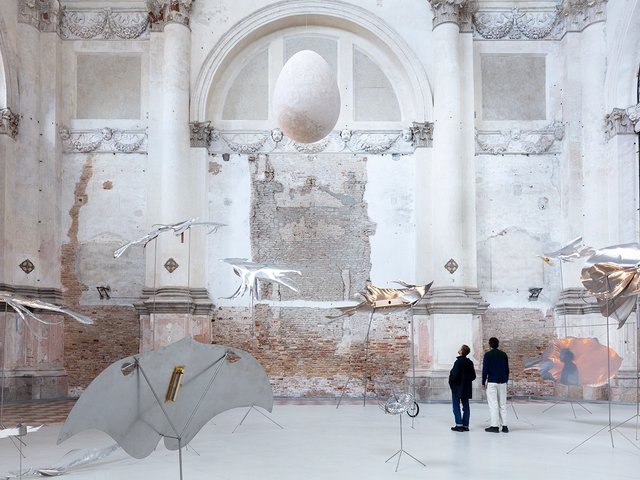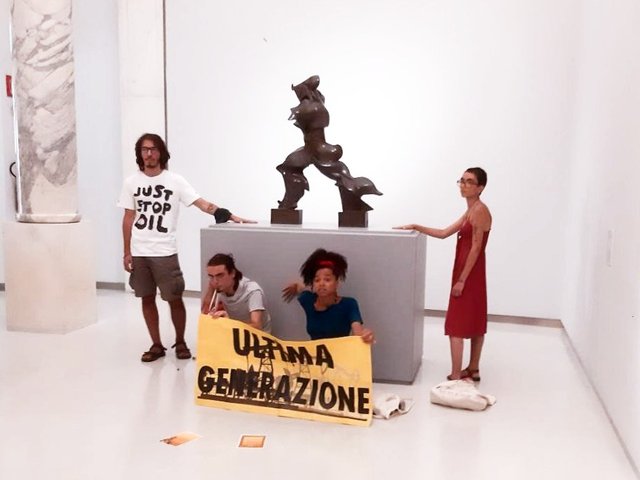Street art in Italy championing LGBTQ+ rights has sparked controversy as the country’s hard-right government has appeared to clamp down on same-sex parents in recent months. Right-wing commentators and politicians have described the works as “shameful” and “perverse”. One fiercely contested mural in the seaside town of Rimini was whitewashed in an apparent act of protest.
The mural by the transgender street artist Oliver Vincenzi, which showed a bearded male feeding a child from an exposed breast, formed part of a larger local mural-painting project backed by Rimini’s left-wing mayor. It was mysteriously removed overnight on 3 April.
In another work, the artist Andrea Villa pasted posters showing the Riace bronzes, two exceptionally well-preserved fifth century BC statues rediscovered in Calabria in 1972, along a busy street in Turin in March. The posters showed the two nude male figures from behind, overlaid with the words “Italy is Gay”.
“I wanted to present the bronzes as gay icons because I believe notions of homosexuality in the classical world are inspiring,” Villa tells The Art Newspaper. “Today, gay people are presented as weak and effeminate. In ancient times—when being gay was only acceptable among the aristocracy—they were considered to be strong and virile.”
Giorgia Meloni’s government has been accused in recent months of limiting the rights of LGBTQ+ people. The ruling right-wing coalition presented a draft law in March extending a national ban on surrogacy to Italians going abroad for the practice, with fines of up to €1m for breaches—a move considered by some as aimed at gay parents. In Milan, long considered a haven for gay people in Italy, 10,000 people protested against the government’s position, before the interior ministry directly ordered Milan mayor Giuseppe Sala to stop issuing birth certificates to same-sex couples who have children through surrogacy.
Federico Mollicone, a lawmaker from Meloni’s Brothers of Italy party, has described homosexual couples as “not allowed” in Italy. Italian law does not permit gay marriage.
Street art has been drawn into the debate. Writing on Facebook, Brothers of Italy lawmaker Riccardo De Corato described Villa’s representation of the Riace bronzes as “a shameful instrumentalisation against the government”. Matteo Montevecchio, an Emilia-Romagna councillor for Matteo Salvini’s right-wing League party, wrote on Facebook that Vincenzi’s work is “a product of the worst kind of perverse transfeminist ideology”.
In a written exchange with The Art Newspaper, Montevecchio claimed that Rimini mayor Jamil Sadegholvaad had been unclear about whether his administration had authorised the work.
Sadegholvaad, however, said in an interview that his administration had not directly funded the work but had authorised Vincenzi to paint it. The mayor added that he had launched an investigation to find out who whitewashed the mural, dismissing an apparent admission by Davide Fabbri, an eccentric self-styled exorcist from Rimini, that he was responsible for removing the work. Sadegholvaad concluded that the protest had backfired by generating nationwide interest. “The paradox is that trying to cover up this ‘scandalous’ mural has in reality made it eternal,” he said.
Meanwhile in Venice, the artist duo Petrit Halilaj and Álvaro Urbano also took aim at the anti-LGBTQ+ stance of Italy’s government with a work unveiled in the deconsecrated church of San Lorenzo in April which is co-commissioned by Audemars Piguet Contemporary and TBA21-Academy. The piece, Lunar Ensemble for Uprising Seas, comprises 30 large-scale aluminium sculptures of fantastical hybrid creatures standing beneath an egg-shaped moon. Kosovo-born Halilaj said that the installation was about “queer futures” and “plural togetherness”. Halilaj and Urbano are a couple professionally and personally, but usually work individually. He said: “As a couple coming here, and also [in relation to] Italy politically, it was important to bring an egg made by two boys. There is space for everyone in society.”





